Wednesday, December 20, 2006
Rufus Singing O Holy Night
Monday, December 18, 2006
Questions Couples Should Ask...
 ...before they get married or partnered up. I found this interesting article on the website of the NY Times. The article has a list of 15 questions married couples should ask (or wish they had) before getting married. If you haven't already answered these questions, maybe now's the time.
...before they get married or partnered up. I found this interesting article on the website of the NY Times. The article has a list of 15 questions married couples should ask (or wish they had) before getting married. If you haven't already answered these questions, maybe now's the time.***************
Relationship experts report that too many couples fail to ask each other critical questions before marrying. Here are a few key ones that couples should consider asking:
1) Have we discussed whether or not to have children, and if the answer is yes, who is going to be the primary care giver?
2) Do we have a clear idea of each other’s financial obligations and goals, and do our ideas about spending and saving mesh?
3) Have we discussed our expectations for how the household will be maintained, and are we in agreement on who will manage the chores?
4) Have we fully disclosed our health histories, both physical and mental?
5) Is my partner affectionate to the degree that I expect?
6) Can we comfortably and openly discuss our sexual needs, preferences and fears?
7) Will there be a television in the bedroom?
Read the rest of the questions by going here.Thursday, December 07, 2006
A Religious Test?
 Last week, Rep. Keith Ellison, a Democrat from Minnesota, who is the first Muslim ever elected to the US Congress, has asked that for his swearing in, he be allowed to swap the Bible out for the Koran, as the book he makes his oath on. As you can imagine, conservatives across the country have exploded in fury over his request. Citing their belief that America is a Christian nation, one religious leader went so far as to say that doing such a thing would "undermine Christian civilization." Such an argument sounds familiar for many LGBT folk.
Last week, Rep. Keith Ellison, a Democrat from Minnesota, who is the first Muslim ever elected to the US Congress, has asked that for his swearing in, he be allowed to swap the Bible out for the Koran, as the book he makes his oath on. As you can imagine, conservatives across the country have exploded in fury over his request. Citing their belief that America is a Christian nation, one religious leader went so far as to say that doing such a thing would "undermine Christian civilization." Such an argument sounds familiar for many LGBT folk.And yet all these conservative zealots forget that America is a nation free of religious tests and a melting pot for many religions. The idea of this melting pot imagery gets lost when one person or ideology thinks everyone needs to share it. Instead, we are bunch of "we's" and not a bunch of "I's".
So, I had planned on writing something about this but instead found two others who wrote very good retaliatory posts. You can find them by going here and by going here.
God's In-Box
 Have you ever wondered what God's Prayer In-box must look like? Go here to see a screen shot on his/er computer screen. By the way, the link opens up a .pdf file.
Have you ever wondered what God's Prayer In-box must look like? Go here to see a screen shot on his/er computer screen. By the way, the link opens up a .pdf file.
Friday, December 01, 2006
$30 of Food?
 Here is an interesting blog about a man who spent only $30 for food during the month of November. He wrote about his experiences and reminds us all how much we spend on things we probably don't need.
Here is an interesting blog about a man who spent only $30 for food during the month of November. He wrote about his experiences and reminds us all how much we spend on things we probably don't need.
Tuesday, November 28, 2006
Proud to be a UCCer
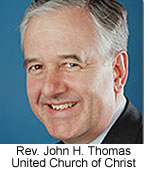 John Thomas, the President of the UCC, wrote a brilliant mini-history of the United Church of Christ. I found it by checking out the UCC's blog over at i.ucc.org. He also wrote to remind us that, in his opinion, "it is better to be a divided church who stands for something than be a united church that stands for nothing." As the UCC is gearing up to celebrate our 50th Anniversary of the merger of the Congregational Christian Church and the Evangelical and Reform Churches, Thomas writes about that history as well as about what the UCC has stood for, both historically and more recently.
John Thomas, the President of the UCC, wrote a brilliant mini-history of the United Church of Christ. I found it by checking out the UCC's blog over at i.ucc.org. He also wrote to remind us that, in his opinion, "it is better to be a divided church who stands for something than be a united church that stands for nothing." As the UCC is gearing up to celebrate our 50th Anniversary of the merger of the Congregational Christian Church and the Evangelical and Reform Churches, Thomas writes about that history as well as about what the UCC has stood for, both historically and more recently.I would encourage you to go pour yourself a cup of coffee, take off your shoes, and scoot up to your monitor for a wonderful and encouraging read. It'll be one of those things that may make you say to yourself when you're finished, "Gee, that was really inspiring; I am really proud to be a UCCer."
Monday, November 27, 2006
Advent 1 is Coming Up
 Beginning next Sunday, we will begin our new season of the liturgical year with the observance of Advent 1. Last Sunday, November 26 finalized the end of our past liturgical year culminating with the celebration of Christ the King Sunday. Next week we begin all over again the story of Jesus as both our Savior and the Christ.
Beginning next Sunday, we will begin our new season of the liturgical year with the observance of Advent 1. Last Sunday, November 26 finalized the end of our past liturgical year culminating with the celebration of Christ the King Sunday. Next week we begin all over again the story of Jesus as both our Savior and the Christ.Did you know that when we follow the Revised Common Lectionary that if we remain true to its Scriptural suggestions, we will preach and read through the Bible every 3 years? This is why many churches and denominations use the lectionary: to help educate our church members and help them become biblically literate.
Another way we help you to learn the Bible is to observe the various cycles in the church year. You will know when we are in a different cycle by the color of the altar and pastoral vestments. On Sundays, we have certain colors displayed on the altar, the pulpit, and the lectionary stand. And, you will notice that I wear a particular colored stole that usually matches the colors you see elsewhere. Each color represents a different cycle.
Here are those colors. There is blue, which is a new color for the season of Advent (although many folks still use the color purple), Purple for the season of Lent, White for Easter and special occasions in which we celebrate weddings or Christ the King Sunday. The color red for Palm Sunday, the Passion of Christ, the day of Pentecost and for special occasions in which God either comes down in a dramatic way or for denominational occasions such as an ordination. We use the color green for the season of Pentecost and for Ordinary Time (the time between Pentecost and towards the end of the liturgical year when nothing fancy is going on. We use the color black for Ash Wednesday (not all UCCers celebrate Ash Wednesday but we do) and Good Friday.
As we enter the season of Advent, you will notice something different all through the 4 Sundays in Advent. We will be doing something different in the services and I will speak more about that next week after we have observed the Lord's Supper. And, during the Lord's Supper we'll be doing so in a unique way that we observed last month when we sang the liturgical responses rather than only reading them as we normally do.
I am looking forward to the season of Advent and beginning again the joy of experiencing the Christian journey of faith with you.
Another Conversation about Branding
 In a continuing conversation many of us are having at church, the idea of branding our church has been a recurrent theme. Having now established our identity missional statement, we now move forward in communicating that statement in our ministry activities. The idea, of course, is to use the statement as a way to 'stay the course' in our pursuit of finding ways to reach out to church-seekers and also as a way to 'remind us all' why we are here.
In a continuing conversation many of us are having at church, the idea of branding our church has been a recurrent theme. Having now established our identity missional statement, we now move forward in communicating that statement in our ministry activities. The idea, of course, is to use the statement as a way to 'stay the course' in our pursuit of finding ways to reach out to church-seekers and also as a way to 'remind us all' why we are here.In such a conversation, branding becomes an underlying theme. And with branding, we should keep asking ourselves: Who do people think we are? Are we remaining true to who we say we are? And while these are thoughtful and good questions to keep asking ourselves, we also need to be careful when asking these questions. In our desire to remain true to our identity, is it possible to lose the ability and elasticity to change when necessary?
In a post written about the struggles with brand marketing that Starbucks Coffee is having, one writer talks about the dangers of branding without entirely chucking the entire concept. Go over and read the post and let us ask ourselves how branding can help us without being tied to it.
Monday, November 20, 2006
The Results of the Identity Survey
 The Good News Team (GNT) has done it! After examining and reading all of the responses to the congregation questionnaire, they have determined the answers to the questions: Who are We? Why are We Here? and Who is Our Neighbor?
The Good News Team (GNT) has done it! After examining and reading all of the responses to the congregation questionnaire, they have determined the answers to the questions: Who are We? Why are We Here? and Who is Our Neighbor?Here is the summary statement of those three questions:
We are a loving, open-minded, caring, dedicated church on a journey to learn, laugh, discover, grow, worship, and praise God together. We invite anyone who needs help on life's journey to experience our hospitality.
As many of you know, the GNT has been working diligently with these questions in order for them to ensure that when we advertise ourselves to our various communities, we are who we say we are. This idea stems from the understanding of the philosophies of branding and marketing.
When it comes to branding and marketing, we are not negating the power and authority of the Gospel, rather we are distinguishing ourselves for the benefit of our prospective member. In this way, we hope that a prospective member will have an understanding of our identity and will be able to make an informed decision as to whether or not their gifts and talents will make a good fit with us. Given that there are many churches that a prospective member may choose to attend, branding and marketing our church as honestly and sincerely as possible will help grow our church accordingly.
When you see a member of the Good News Team, be sure and thank them for the dedication and hard work.
Monday, November 13, 2006
Nervous Pastors
 I would like to offer a special thanks to my friend Paul who directed me to a post from Mark Driscoll regarding his protective guidelines for a pastor. Driscoll, a post-emergent pastor, wrote his post in response to the Ted Haggard mess and writes to warn all other pastor's to be careful to protect themselves from sexual temptation. Go here to read Driscoll's list. You'll need to scroll down a page.
I would like to offer a special thanks to my friend Paul who directed me to a post from Mark Driscoll regarding his protective guidelines for a pastor. Driscoll, a post-emergent pastor, wrote his post in response to the Ted Haggard mess and writes to warn all other pastor's to be careful to protect themselves from sexual temptation. Go here to read Driscoll's list. You'll need to scroll down a page. His list is both frightening, kinda freaky, and yet, clear that we all need to be careful when it comes to temptation. Admittedly, I was aghast at how he looks at women, as if they are all seductive vixens. And, blaming Haggard's wife for Haggard's fall is one example of how scapegoating only serves to strengthen an argument from the person talking about it and has next to nothing to do with the real issue of the person or thing that person is referencing.
His list is both frightening, kinda freaky, and yet, clear that we all need to be careful when it comes to temptation. Admittedly, I was aghast at how he looks at women, as if they are all seductive vixens. And, blaming Haggard's wife for Haggard's fall is one example of how scapegoating only serves to strengthen an argument from the person talking about it and has next to nothing to do with the real issue of the person or thing that person is referencing.Okay, so all that aside, take a look at Driscoll's Safeguards and let me know what you think.
What the Bleep?
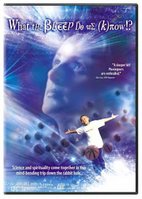 Last night, we had around 30 folks to watch the movie, 'What the Bleep Do We Know?' The movie, part existentialism, part spirituality, part quantum physics, sought to help us ask ourselves questions about who we are and why we are here.
Last night, we had around 30 folks to watch the movie, 'What the Bleep Do We Know?' The movie, part existentialism, part spirituality, part quantum physics, sought to help us ask ourselves questions about who we are and why we are here.The movie elicited some interesting responses. On the whole, most folks fell into the categories of either they liked it or they didn't.
I enjoyed the movie because it opened up to us an awareness of the power of our thought-processes and how we can become stuck in our addictive emotional behaviors. I also enjoyed the way in which the ideas of interconnectivity were explored.
Unfortunately, I had forgotten about a couple of racy scenes used to explain the power of sex when it comes to the receptive proteins in our brain. There was a couple of times that I was embarrassed for some of the parents who had brought their pre-teen kids to the movie. Actually, I was horrified. The parents forgave me- but I can only imagine the conversations those parents had when they got home.
All in all though, the movie was thought-provoking for many.
Our next movie will be showing The DaVinci Code. We'll probably be viewing it in January with a discussion and food/refreshments to follow.
Thursday, November 02, 2006
Contemplating a New Sacrament
 Last week at the Fosdick Convocation, I had an epiphany--well, sort of. Maybe it was more of a lightbulb flashing brightly above my head. I had listened to one of the lectures about the parable of the Sheep and the Goats. The parable goes like this, it is from the Book of Matthew:
Last week at the Fosdick Convocation, I had an epiphany--well, sort of. Maybe it was more of a lightbulb flashing brightly above my head. I had listened to one of the lectures about the parable of the Sheep and the Goats. The parable goes like this, it is from the Book of Matthew:Matthew 25:31-46
"When the Son of Man comes in his glory, and all the angels with him, he will sit on his throne in heavenly glory. All the nations will be gathered before him, and he will separate the people one from another as a shepherd separates the sheep from the goats. He will put the sheep on his right and the goats on his left.
"Then the King will say to those on his right, 'Come, you who are blessed by my Father; take your inheritance, the kingdom prepared for you since the creation of the world. For I was hungry and you gave me something to eat, I was thirsty and you gave me something to drink, I was a stranger and you invited me in, I needed clothes and you clothed me, I was sick and you looked after me, I was in prison and you came to visit me.'
"Then the righteous will answer him, 'Lord, when did we see you hungry and feed you, or thirsty and give you something to drink? When did we see you a stranger and invite you in, or needing clothes and clothe you? When did we see you sick or in prison and go to visit you?'
"The King will reply, 'I tell you the truth, whatever you did for one of the least of these brothers of mine, you did for me.'
"Then he will say to those on his left, 'Depart from me, you who are cursed, into the eternal fire prepared for the devil and his angels. For I was hungry and you gave me nothing to eat, I was thirsty and you gave me nothing to drink, I was a stranger and you did not invite me in, I needed clothes and you did not clothe me, I was sick and in prison and you did not look after me.'
"They also will answer, 'Lord, when did we see you hungry or thirsty or a stranger or needing clothes or sick or in prison, and did not help you?'
"He will reply, 'I tell you the truth, whatever you did not do for one of the least of these, you did not do for me.'
"Then they will go away to eternal punishment, but the righteous to eternal life."
Hearing this parable and the subsequent sermon, my mind found itself wandering over to the Roman Catholics who teach in transubstantiation, the blessing that turns the bread and wine into the actual body and blood of Christ during their Holy Communion. "This is my body..." they say and mean quite literally. I remember asking a priest friend of mine why they take Jesus' words so literally when it was "obviously" a symbolic act. My priest friend said, "Bo, Jesus said, 'This IS my body,' I don't see why you think that is symbolic."
My conversation with my priest friend happened almost a decade ago and I was thinking about that when I read and heard the parable of the Sheep and the Goats when Jesus said, "In as much as you do it to the least of these my brothers and sisters, you do it to me." How much more, I thought, could Jesus' words be more real and non-symbolic that reading this parable.
As a pastor in the United Church of Christ, we do not believe in transubstantiation during the communion celebration but many of us do believe in a real presence. Borrowing heavily from the Lutherans, we see a mystery occur when God is present during the communion celebration. But our ancestors of the faith certainly believed communion meant something much more and made it one of the sacraments of the church.
At the Council of Trent, back in 1545, a conversation and decisions were made limiting what the Church would allow as its Sacraments. Prior to that meeting, there were many sacraments. Worrying that putting too much faith into a sacrament might negate the grace involved, the Catholic Church decided that there would only be 7 of them: Baptism, Confirmation, Penance, The Eucharist, Extreme Unction, Orders (the call of the clergy), and Matrimony.
Most Protestant Churches, however, have rejected all but two: baptism and Holy Communion (the Eurcharist). The idea is that in these two situations, it can be proved that they were used by Jesus and the early church aside from later church validation.
Understanding the sacraments and their history can be a tedious study--one that I plan to engage at great length. But in spite of all that has been considered a sacrament, I am surprised that one element has been missing from the entire history for its consideration: the Sacrament for the Poor (and the poor in Spirit). How come? Obviously the care of the poor, the lonely, the imprisoned, the naked and the homeless was of primary concern for Jesus. And we know the early church took this very seriously too. How come our identity as Christians has not been tied to this most important and defining characteristic that Jesus identified as essential to the life of the Christian?
One argument may lie in the challenge that if the care of the poor is considered a 'work of faith' then what about grace? I have read about this and would love to link you to a story of it but the linking functions with blogger is down at the moment. I'll post a link in a few days.
But it is arguments such as this that highlight a point: sometimes we get so concerned with theology that we miss the point altogether. It is one thing to hold care of the poor as an important task of the church--it is something else entirely when we say that the care for the poor defines a Christian. If we say the latter, surely we run into theological conundrums-- and yet, how can we miss Jesus' point-blank declaration that if we don't care for the poor, we 1) don't care for him, and 2) we'll go to hell. You can't get any clearer than that.
My personal opinion about Jesus and the church isn't necessarily a neat one. Jesus was often frustrated with the pious and devoutly religious and I wonder if he had intended for the early church to become so rigid in their theology. I think the theology of Paul is a lot more complicated than what Jesus had in mind. Paul seems concerned that our understanding of God fit into a nice and neat systematic theology textbook--whereas Jesus was more concerned with how we live out our faith. Often, Jesus called those who put theology above Christian practice hypocrites. And yet, Jesus obviously meant for the church to survive and thrive.
Where did we go wrong?
In the coming weeks, I will be writing my thoughts about sacraments and a radical idea to make and create a Sacrament to the Poor (to also include the poor in Spirit). I am currently in talks with my Conference Minister in Baltimore as well as a friend who works as a Worship Team member in the Cleveland office, the home of our denomination. Considering how to move forward with this consideration will include many conversations--here, in the pulpit, and elsewhere.
I invite you, dear reader, to join with me on this journey. Let us talk, ask, and get acquainted with our faith tradition--and see if in this way, we might ask ourselves that reoccuring question that each new member of the UCC is encouraged to do: to reinterpret what in means to be a Christian in this and every generation.
Monday, October 30, 2006
The Phoenix Affirmations
As people who are joyfully and unapologetically Christian, we pledge ourselves completely to the way of Love. We work to express our love, as Jesus teaches us, in three ways: by loving God, neighbor, and self.
(Matt 22:34-40 // Mk 12:28-31 // Lk 10:25-28; Cf. Deut 6:5; Lev. 19:18)
Christian love of God includes:
1. Walking fully in the path of Jesus, without denying the legitimacy of other paths God may provide humanity;
2. Listening for God’s Word which comes through daily prayer and meditation, studying the ancient testimonies which we call Scripture, and attending to God’s present activity in the world;
3. Celebrating the God whose Spirit pervades and whose glory is reflected in all of God’s Creation, including the earth and its ecosystems, the sacred and secular, the Christian and non-Christian, the human and non-human;
4. Expressing our love in worship that is as sincere, vibrant, and artful as it is scriptural.
Christian love of neighbor includes:
5. Engaging people authentically, as Jesus did, treating all as creations made in God’s very image, regardless of race, gender, sexual orientation, age, physical or mental ability, nationality, or economic class;
6. Standing, as Jesus does, with the outcast and oppressed, the denigrated and afflicted, seeking peace and justice with or without the support of others;
7. Preserving religious freedom and the Church’s ability to speak prophetically to government by resisting the commingling of Church and State;
8. Walking humbly with God, acknowledging our own shortcomings while honestly seeking to understand and call forth the best in others, including those who consider us their enemies;
Christian love of self includes:
9. Basing our lives on the faith that, in Christ, all things are made new, and that we, and all people, are loved beyond our wildest imagination – for eternity;
10. Claiming the sacredness of both our minds and our hearts, recognizing that faith and science, doubt and belief serve the pursuit of truth;
11. Caring for our bodies, and insisting on taking time to enjoy the benefits of prayer, reflection, worship and recreation in addition to work;
12. Acting on the faith that we are born with a meaning and purpose; a vocation and ministry that serves to strengthen and extend God’s realm of love.
Friday, October 20, 2006
The God of Awe
 Writing as a commentary to the Job lectionary reading for this week, Annie Dillard explains God’s response to Job’s demand for an answer to his trials,
Writing as a commentary to the Job lectionary reading for this week, Annie Dillard explains God’s response to Job’s demand for an answer to his trials,taken from “Holy Sparks: A Prayer for the Silent God” in Best Spiritual Writing 2000.
Thursday, October 19, 2006
The New Order of Worship
 When Sherry Taylor met with the Pastoral Relations Committee last night, she encouraged me to use this blog as a space to explain why we do the things we do. This can give you, the reader, an opportunity to know that for the most part, there is a method to my madness.
When Sherry Taylor met with the Pastoral Relations Committee last night, she encouraged me to use this blog as a space to explain why we do the things we do. This can give you, the reader, an opportunity to know that for the most part, there is a method to my madness.How fortunate I feel to be your pastor! You put up with a host of fun, new, innovative, and sometimes weird things and ideas from me. But I mustn't take all the credit, often whenever a new idea or a new way to do things finally makes it to the congregation in worship, it has been viewed and reviewed by the Board of Deacons. Actually, both Ann and I have worked together on almost all of the new ideas (save the movement of the pews- and that we talked about beforehand, we just didn't actually decide on anything).
As you look at the new Order of Worship, you will find that it now has new categories. Following examples in the UCC's Book of Worship and altered to fit our congregational needs, the bulletin now has these subject headings:
Gathering for the Word
which includes our Welcoming, Call to Worship, Prayer of Invocation, Processional Hymn and the Choral Introit
Imagining the Word
this is the place where we'll put a children's sermon, a liturgy, or skit
Hearing the Word
which includes both the Scripture reading and the Choral Anthem
Responding to the Word
here we have the Call to Offering and the Offertory, the Doxology or Hymn of Praise, the Prayer of Dedication, the Passing of the Peace, and the Song of Celebration
Touching the Word
the sermon goes here followed by the Pastoral Prayer, the prayers of the people, the Lord's Prayer, and the choral Amen.
Sending with the Word
which includes the Recessional Hymn, the Commissioning and/or Blessing, and the Choral Response.
Another change you have noticed is the placement of the Announcements. It used to be at the beginning of worship. It was moved to the Coffee Hour that immediately follows worship because we discovered that the announcements were taking 10-15 minutes. By the time Worship actually started, we were worn out. And, the longer announcements meant that the overall service was running over 10-15 minutes (or longer!).
All in all, the change in the worship is meant to enhance 'the flow' of the service where one part leads into the next in as seamless a manner we can find that builds and ebbs and empowers. This can be tricky and takes some adjusting from time to time. Fortunately Ann and I work great together. We'll try and try again to help make the service as special and spiritual beneficial to all who gather on Sundays.
Pastoral Relations Committee
 Last night, Sherry Taylor, the NJ Association Conference Minister met with the newly formed Pastoral Relations Committee and myself. Together we learned exactly what the PRC is and what it is supposed to do.
Last night, Sherry Taylor, the NJ Association Conference Minister met with the newly formed Pastoral Relations Committee and myself. Together we learned exactly what the PRC is and what it is supposed to do.Sherry laid to rest a few myths about the committee itself. It isn't a committee that church members goes to complain about things. It is a committee that encourages a relationship between church members and their pastor- if a concern is raised, they will help church members approach the pastor together.
The committee also doesn't act on behalf of the pastor to the congregation; it does act with the pastor in offering insight into the life of the congregation as well as give history about the people and their traditions.
The committee doesn't judge the pastor or communicate gripes to him; the committee does work with the pastor to help make the most of the relationship by allowing both sides to communicate freely and confidentially.
Let us all support the Pastoral Relations Committee for their volunteering to create and make this committee a wonderful complement to the relationship between the church body and their pastor (me). ;) The members of the new committee are Bob Hargrove, Jr., Opal Horvat, Dot Pontician, Ed Minkler, and Lauren Farrell.
Tuesday, October 17, 2006
Great Quote
Can I get an Amen?
Saturday, October 14, 2006
Putting It All in Perspective
 I received this note today from a friend. You may have seen one form or another of it before, it has circled around the Internet for quite awhile. Still, it bears thinking about. While I am not a statitician and cannot verify the accuracy of the numbers, even if the numbers are close, they tell us something incredible: Most of us are very fortunate, probably more fortunate than we might ever imagine. We truly have much to be grateful for.
I received this note today from a friend. You may have seen one form or another of it before, it has circled around the Internet for quite awhile. Still, it bears thinking about. While I am not a statitician and cannot verify the accuracy of the numbers, even if the numbers are close, they tell us something incredible: Most of us are very fortunate, probably more fortunate than we might ever imagine. We truly have much to be grateful for.***
If the population of the Earth was reduced to that of a small town with 100 people, it would look something like this:
57 Asians
21 Europeans
14 Americans (northern and southern)
8 Africans
52 women
48 men
70 colored-skins
30 Caucasians
89 heterosexuals
11 homosexuals
6 people would own 59% of the whole world wealth and all of them will be
from the United States of America
80 would have bad living conditions
70 would be uneducated
50 underfed
1 would die
2 would be born
1 would have a computer
1 (only one) will have higher education
When you look at the world from this point of view, you can see there is a real need for solidarity, understanding, patience and education.
Also think about the following This morning, if you woke up healthy, then you are happier than the 1 million people that will not survive next week.
If you never suffered a war, the loneliness of the jail cell, the agony of torture, or hunger, you are happier than 500 million people in the world.
If you can enter into a church (mosque) without fear of jail or death,
you are happier then 3 million people in the world.
If there is a food in your fridge,
you have shoes and clothes,
you have bed and a roof,
you are richer then 75% of the people in the world.
If you have bank account, money in your wallet and some coins in the money-box, you belong to the 8% of the people on the world, who are well-to-do.
Wednesday, October 11, 2006
What is the Emergent Church?
To the critics of tradition, there are those who say that culture has changed so dramatically in the last 50 years, that to not update our message will result in our churches dying off and become irrelevant to future generations. These critics point to statistics that explain that 80% of churches have plateaued in number and are now losing membership. Other critics show that with over 3,000 churches closing annually, something needs to be done to make the church seem and be more relevant than it is at the present time.
Those critics actually have a name. Within both evangelical and liberal circles, that name is Emergent. The emergent church is a canopy that includes those leaders and churches who are trying to reimagine what church can mean to a world that no longer finds itself identified as Christian as it has been identified in the past. Because the canopy of emergent is so wide and includes so many people and ideologies, here is a video of an interview with Mark Driscoll, an emergent pastor that actually has some reservations about the emergent process. In this video, he explains the different streams within the Emergent Church, what they are doing, and how to recognize them.
The Challenge in Bible Study
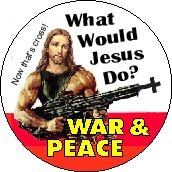 Robin Lovin, a professor of ethics at Southern Methodist University, wrote a revealing and honest portrayal of the discernment required when engaging Biblical texts in study or worship. He said,
Robin Lovin, a professor of ethics at Southern Methodist University, wrote a revealing and honest portrayal of the discernment required when engaging Biblical texts in study or worship. He said,The strange world of the Bible that Barth and Bonhoeffer wanted us to enter is not located in a particular place or time. But they were right to think that we cannot enter it as long as we suppose it is readily available to us, right where we are now. The hardest part for students is moving beyond the assumption that everybody else is just like us and always has been. Biblical scholarship cannot deliver the word of God by taking us to the biblical world, but it may help us to live a little less in our own comfortable, familiar world. When we ask, "What would Jesus do?" our efforts to follow in his steps will mean moving away from the place where we were when we first asked the question.
****
What Lovin has in mind reminds us of the challenge to find what Jesus meant by the words he spoke. It is always a temptation, I think, as we put ourselves in the place of the hearers of Jesus' words and to know exactly what Jesus meant. Given the cultural influence of his day and the reality that the disciples were hearing Jesus for the first time (unlike us who've heard his words throughout our lives), knowing what they "heard" is next to impossible. And yet, Jesus knew that when he spoke to them and his words were undoubtedly spoken in a way that his disciples could understand what they heard.
So for us today, going back to try and put ourselves in the place of the disciples is more than a challenge. And yet it is a challenge that we must do regardless of the pursuit-- doing otherwise (e.g., putting Jesus' words into our present-day context) may provide an unexpected result: completely transforming Jesus' words into something else entirely.
Go here to read Lovin's article and read how he explains the necessity that simply asking, "What would Jesus do?" is not enough.
Monday, October 09, 2006
Voices of Faith
 I picked up Carter's book, Our Endangered Values at my local bookstore today. Former President Carter has become quite a prolific writer and moderate and discerning voice of faith in a auditorium of voices and noises that seem to reflect an "American faith" rather than the faith of our ancestors.
I picked up Carter's book, Our Endangered Values at my local bookstore today. Former President Carter has become quite a prolific writer and moderate and discerning voice of faith in a auditorium of voices and noises that seem to reflect an "American faith" rather than the faith of our ancestors.I am so looking forward to reading his insights and personal stories of faith. He is one heck of an American statesman.
Wednesday, October 04, 2006
Tithing made Illegal?
 According to a NY federal judge, a person who has declared bankruptcy cannot make charitable contributions. More specifically, he said bankruptcy reforms passed by Congress last year bar individuals from making charitable contributions if they are also seeking bankruptcy protection.
According to a NY federal judge, a person who has declared bankruptcy cannot make charitable contributions. More specifically, he said bankruptcy reforms passed by Congress last year bar individuals from making charitable contributions if they are also seeking bankruptcy protection.Sen. Barak Obama has submitted a bill to allow for an exemption when making contributions to one's church. You can read more about that here.
I am amazed at a judge who would not take into account one's faith when making such a declaration; but then, one would have to wonder if a person who actually filed for bankruptcy was ever capable enough to be a tither too. Surely there are those who do so but in some sense, it makes me wonder if they may be "robbing Peter to pay Paul" in making and meeting their financial obligations.
And then there are those who have had to file for bankruptcy due to circumstances beyond their control. As more and more Americans find themselves living from one paycheck to the next, any unforseeable emergency or medical necessity can easily find themselves in debt. It makes one wonder how far our economic troubles go when the gab between the wealthiest and the poorest is so wide. Perhaps this is one more causality of our capitalism that seems so out of control, one wonders if the gap will only get wider and the troubles and problems of the poor will only continue to escalate.
The Fosdick Convocation
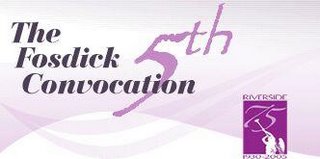 From October 23-26, I will be attending the 5th assembly of the Fosdick Convocation at The Riverside Church, in New York City. Fortunately I live close enough to drive in (or ride the bus).
From October 23-26, I will be attending the 5th assembly of the Fosdick Convocation at The Riverside Church, in New York City. Fortunately I live close enough to drive in (or ride the bus).The theme for the week will be "For the Living of These Days" and it will feature guest speakers that include the retiring James Forbes, Barbara Lunblad (my preaching professor from seminary, What...me name-drop?), Brian McLaren (my fav emergent leader), Tony Campolo (that should be interesting), Garnder Taylor, Barbara Brown Taylor, Cornel West and many others. Bill Moyers will be the facilitator for the meeting.
You can read more about the convocation by going here.
Tuesday, October 03, 2006
A Violent History: A Violent Now
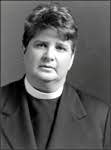 Kathleen Rusnak is a pastor at the ECLA Lutheran church in Cresskill, NJ. Being a neighboring pastor, I was intriqued to discover that she has her own blog. In her last entry, she articulates an interesting similarity with the fundamentalist Muslims who want to force Christians to convert to Islam in relation to the Christian Crusades, where our ancestors of the faith demanded a similar conversion. It makes us think mightily how religion, power, and a self righteous determination can become a violent and dangerous mixture.
Kathleen Rusnak is a pastor at the ECLA Lutheran church in Cresskill, NJ. Being a neighboring pastor, I was intriqued to discover that she has her own blog. In her last entry, she articulates an interesting similarity with the fundamentalist Muslims who want to force Christians to convert to Islam in relation to the Christian Crusades, where our ancestors of the faith demanded a similar conversion. It makes us think mightily how religion, power, and a self righteous determination can become a violent and dangerous mixture.How we respond to such threats goes part and parcel with our Christian faith. What would Jesus do? (WWJD) is a popular mantra. A mantra that also fits us is "WWYD", What Would YOU Do? Acting and reacting with our faith and sensibilities, we are sometimes confronted with diameterically opposed solutions. Sure, Jesus would turn the other cheek. If we turn the other cheek, would that mean a forced conversion on our part or would we be begin another era of Christian martyrdom?
But more important to responding to such threats from extremists, how do we respond to peaceful muslims who want to dialogue and become acquainted with us? How do we find common grounds in which to share our faith and better understand our shared faith traditions? Perhaps we can meet at the table and discuss our common lot when it comes to using one's faith as a weapon of destruction instead of as an opportunity of peace. Many Christians have learned through the moral failings of our ancestors. How might we share what we've learned with those now in it?
Rusnak's post is good food for thought as she examines the similarities and asks us to be thoughtful in our response. Here is a brief excerpt of what she wrote:
*******
Both Christian and Muslim estremists teach us something important. They have found the seeds of genocide in each of our faiths, and they have acted on them. One thing is for sure, neither of us can remain scriptural literalists any longer. These deadly passages, the theology that flows from them, cannot be ignored. The long theological and scriptural investigation, which already began in Christianity after the Holocaust, hopefully will begin for Islam now. That is our only hope!
Yes, extremists are ours. Both Christians and Muslims, both past and present, whom we would love to disown, but cannot. They are ours then and they are ours now. Only by this claiming can we repent. Only by this claiming can we change. Only by this claiming can we become whole.
Read the entire post here.
The Great Transformation
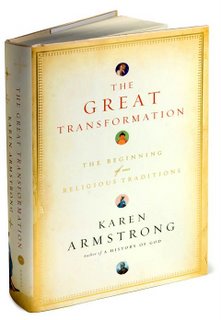 Karen Armstrong has a new book out titled, The Great Transformation: The Beginning of our Religious Traditions. Armstrong, who is noted for both her scholasticism and storytelling abilities, takes the reader on a readable review of the birth of the major religious traditions that still exist today.
Karen Armstrong has a new book out titled, The Great Transformation: The Beginning of our Religious Traditions. Armstrong, who is noted for both her scholasticism and storytelling abilities, takes the reader on a readable review of the birth of the major religious traditions that still exist today.Or, at least, that is what the review I just read said. I am going out to buy the book this afternoon.
Almost as impressive as the recommendation for Armstrong's book is the review itself of the book. You can read a portion of that below. At the end of the article, I'll provide a link to the full review.
*********
The Great Transformation provides the reader with a way of isolating each of the major religions of the world and seeing how each tradition found its own way of addressing its individual challenges while still remaining wedded to a moral ideal that each expressed in terms of its own history and symbolic tradition. There is no attempt in the book to elide the complications and the difficulties that the innovators faced in their time. Figures like the Hebrew prophets; the Buddha and Confucius and their heirs; the Greek philosophers and tragedians; all rose in the context of crisis and conflict. The age was one of unrelenting war and bloodshed, of great and deep injustices and struggles. Their words and ideas were articulated in societies that often sought to reject them. As time went by, the innovations and the radicalism of these thinkers was, as Armstrong has already noted for us, co-opted by the mainstream and diluted – sometimes to the point of reversing the moral center of gravity demanded in the texts and pronouncements of these traditions.
In our Modern age we have seen an attempt to sublimate religious ideas and traditions with the concomitant result of finding resurgent and often intolerant forms of religion emerge in ways that have led to ever more violence and dysfunction. In spite of the attempts of humanists and academic scholars to lay out the historical context of Axial Age thought, the innate prejudices of the Modern against the values of the mythical and the spiritual, values that are often trumped in favor of the scientific and the technological, very frequently removes the moral aspects of our religious heritage from the current discourse on values.
Serious Choices
 This past Sunday I preached a sermon about Jesus' words--"If your right hand causes you to sin, cut it off." Here is an excerpt:
This past Sunday I preached a sermon about Jesus' words--"If your right hand causes you to sin, cut it off." Here is an excerpt:It was one of the most gripping news stories of 2003. In the beautiful but desolate mountains of southeastern
At the end of several days with no food or water, however, Aron made a remarkable choice. Aron Ralston decided to amputate his arm in order to save himself. And that’s exactly what he did, using only a pocket knife. What an amazing display of courage and determination. After he was finished, he applied a tourniquet to his arm and rappelled nearly 70 feet to the floor of the canyon. Then he hiked five miles downstream where he encountered some other hikers and was rescued. Aron Ralston made the obviously excruciating decision to amputate his right arm to save his life.[1]
Who can read this story without thinking of Jesus’ words from our lesson for today, “If your hand causes you to sin, cut it off. It is better for you to enter life maimed than with two hands to go into hell”? What a stark declaration. “If your hand causes you to sin, cut it off.” Is this on the same level as those societies that cut off the hands of thieves? We view that as barbaric. This is not the Jesus we prefer. We like a soft Jesus, one who talks like a guru from the 1960s about peace and love and how we are all God’s children. This harsher, more strident Jesus offends our live-and-let-live sensibilities. Obviously Jesus did not mean literally that we are to cut off an offending appendage. Still, the words convey an earnestness that we ought to heed. “If your hand causes you to sin, cut it off.”
Sometimes in life we have to choose. Isn’t that what Jesus is saying? You really can’t have it all. Sometimes you have to choose. Aron Ralston certainly made a choice--sacrifice his arm in order to save his life. There are choices that must be made in life and those choices determine our destiny.
[1] Dave Burchett, Bring ‘Em Back Alive–A Healing Plan for Those Wounded by the Church (WaterBrook Press, Colorado Springs, CO, 2004).
Wednesday, September 27, 2006
Growing a Church
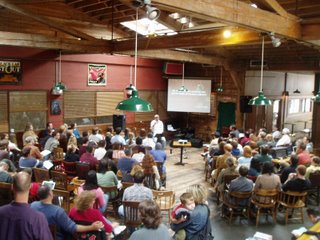 Bob Hyatt, is a church planter and new pastor of a church in Evergreen Community Church in Portland, Oregon. The church began with just a few folks and has grown exponentially. There are troubles with growing too fast- most notably that the attention necessary to meet and greet the newcomers gets lost and they leave feeling as though the church doesn't care about them.
Bob Hyatt, is a church planter and new pastor of a church in Evergreen Community Church in Portland, Oregon. The church began with just a few folks and has grown exponentially. There are troubles with growing too fast- most notably that the attention necessary to meet and greet the newcomers gets lost and they leave feeling as though the church doesn't care about them.And so a church reacts by adding new ministers and new programs, over-extending itself and sometimes putting themselves in debt. Working your tail off to get the church and going can also lead to burnout and a whole host of other problems.
Presently his church meets in homes, at neighborhood bars, or anywhere else they can find a place to put all the people. What his church is doing is inspirational and shows how creative they are in coming up with new ideas to tell "the old, old, story."
Bob writes about his struggles in his church start. Reading his thoughts and insights you can tell he is a soul searcher doing an amazing thing. Check out his blog, visit his church wesbite, and think how we can do something similiar here.
Sunday, September 24, 2006
Our Calling and our Vocations
Your Irrevocable Calling
by Os Hillman
For God's gifts and His call are irrevocable. - Romans 11:29 It is dangerous to align your calling and your vocation as dependent on each other. God calls us into relationship with Him. That is our foremost calling. It is from this relationship that our "physical" calling results. Whether that is to be a teacher, a stockbroker, a nurse, a pastor, or any number of vocations, we must realize that when He calls us, the change in vocation never changes His call on our lives. It is a mere change in the landscape of our calling. This is why it is dangerous to associate our purpose and calling too closely with our work. When we define our work life exclusively as our calling, we fall into the trap of locking up our identity into our vocation. This promotes aspiration because of a need to gain greater self-worth through what we do.
It is dangerous to align your calling and your vocation as dependent on each other. God calls us into relationship with Him. That is our foremost calling. It is from this relationship that our "physical" calling results. Whether that is to be a teacher, a stockbroker, a nurse, a pastor, or any number of vocations, we must realize that when He calls us, the change in vocation never changes His call on our lives. It is a mere change in the landscape of our calling. This is why it is dangerous to associate our purpose and calling too closely with our work. When we define our work life exclusively as our calling, we fall into the trap of locking up our identity into our vocation. This promotes aspiration because of a need to gain greater self-worth through what we do.
Os Guinness, author of The Call, describes the great artist Picasso, who fell into this trap.
"When a man knows how to do something," Pablo Picasso told a friend, "he ceases being a man when he stops doing it." The result was a driven man. Picasso's gift, once idolized, held him in thrall. Every empty canvass was an affront to his creativity. Like an addict, he made work his source of satisfaction only to find himself dissatisfied. "I have only one thought: work," Picasso said toward the end of his life, when neither his family nor his friends could help him relax. [Os Guiness, The Call (Nashville, Tennessee: Word Publishing, 1998), 242.]
What happens when you lose your job? Do you lose your calling? Do you lose your identity? Do you lose your sense of well-being? No. Calling involves different stages and experiences in life. Disruptions in your work are an important training ground for God to fulfill all aspects of His calling on your life. Trust in your God who says your calling is irrevocable and that all things come from Him.
Saturday, September 23, 2006
Salvation through Violence?
Interestingly enough, last week I ran across a comment on a blog asking if violence is ever a sin, and if it were, how would Christians be divided in various positions very much akin to how Christians are divided over their view of sex.
And then yesterday, I was commenting on a post over on a friend's blog comparing Islam extremists to the religion of Islam to Christian understandings of violence. One of the comments on that blog was at odds with the Islam understanding of violence as compared to the Christian view that violence plays no part in the Christian's salvific experience. Unfortunately though, as I pointed out in my response, is that Christianity does have a violent streak when we explain that Jesus' death and crucifixion paid the price for our sins. In his violent death, their is redemption, right?
Christianity and Judeo-Christianity has a violent streak that runs from Genesis through Revelation. Beginning with the nation of Israel invading a land that did not belong to them and killing its inhabitants to disobedient Israelites being slaughtered at Joshua's hand. We find examples of obedience through violence in the proclamations of Moses and the prophets who demand death as a payment for sinful behavior. Enter into the New Testament, and Jesus' death at the hands of his enemies provided a salvation for anyone who confesses Jesus as Lord.
I wonder if violence were not a part of the salvific experience and Jesus instead held a prayer meeting in the Garden of Gethsemane and invited anyone to come forward to take Jesus into their hearts, if that would have been a softer approach than first being beaten and then being hung on a cross bleeding to death at the hands of the Romans. Or, in the mindset that Jesus' death had to pay for sins (again the violent act of redemption), if Jesus could simply have laid down on an altar (think of Isaac willingly laying down on the alter for his father Abraham) and, instead of a knife being used, his Spirit could simply have been released from his body by the same voice of God that declared, "This is my Son, in whom I am well pleased." That voice could also have said, "Well done, my faithful child. Now come home Son, I've missed you." Would this be a way out of the violence of Jesus' atoning sacrifice?
My point in all this is to help us see that violence plays a huge part in our own salvific history. We need to be mindful of others who employ violence in order that they too, may find salvation. While not justifying a militant's fanaticism, we might explore other methods of gaining the world's sympathy and finding another solution to ending terrorism than by violence, scapegoating, and alienation alone.
Discussing such discussions begs us to also talk and engage those who question and challenge violence as a means to salvation. For this reason, many liberation theologies speak out against violence as a means of salvation because it has so often justified other kinds of violence (e.g., spouse abuse and war). If violence does not lead to salvation, as Mary Daly and Rosemary Ruether (two liberation feminists) suggest, then what does lead to salvation? Could Christianity have missed the real message of salvation and redemption of Jesus by focusing on the wrong way in which salvation occurs?
I believe these are good questions to ask; otherwise, we might think we're better than someone else while we go about killing others in the name of terrorism, war, or white hetero-European-Christian-centristic moral cleansing. And, while we're at it, maybe we will find a solution to ending this war on terrorism that is killing so many innocent people along the way.
I am even tempted to ask, can their ever be redemption when collatoral damage occurs? But I won't ask, that'd be another post for another day.
True Wisdom
 On Sunday, we are going to be reading James 3 in church as part of our lectionary text. In the reading, James makes the case that true wisdom is synonymous with being virtuous. Or, put another way, being virtuous can also make you wise.
On Sunday, we are going to be reading James 3 in church as part of our lectionary text. In the reading, James makes the case that true wisdom is synonymous with being virtuous. Or, put another way, being virtuous can also make you wise.I think one challenge many of us face as we go through high school, then college, and sometimes to graduate school and beyond, is that we think that a wise person is someone with educational degrees. The more degrees a person has, the more likely we are to trust their judgment. And, if they are a doctor of any kind, we tend to take their keen insights as facts, rather than as an educated recommendation.
Honestly, I am like that sometimes too. I trust my medical doctor to give me sound medical advice. When also I should be researching things myself to be an educated patient, sometimes I get lazy and let him make all the decisions for me. As any of our older congregants can tell us, to do can lead to big mistakes. Doctors, after all, are only human and able to make mistakes too.
When I was younger, I often found myself in awe with anyone who had a college or graduate degree. It wasn't until I too had a college degree that I discovered people who were just as silly and prone to error as anyone else. And, I found that true wisdom isn't learned in the classroom. It is learned somewhere else.
Some people think true wisdom is learned in the School of Hard Knocks. Living life 'in the real world', so to speak, educates a person into wisdom. However, I know several people who think they are wise but they are actually pessimists (or, 'realists' as they would say). The real world or graduating from the School of Hard Knocks can open our eyes to situations where we realize that we are responsible for our decisions. And, it can also help make us more responsible. And, it can help us appreciate where we've been and where we're going. But that in and of itself, doesn't make us wise. I mean, not everyone who has had a tough life is wise, right? Many folks who have had tough lives are sometimes prone to harmful coping mechanisms that comfort their frustrations. Many of them use the benefits of escapist opportunities such as getting drunk every night, over eating, or doing drugs to appease their egos. In other words, living a hard life in and of itself doesn't make a person wise in the way our lectionary texts explain divine wisdom.
According to James, the brother of Jesus, being virutous makes us wise. If we do good works, pursue peace, be gentle, or yield to others when the situation gets out of hand, we become wise. If we live life with integrity and let our yes's be yes's and our no's be no's, then we become wiser.
I think my biggest challenge has been learning that God's wisdom is very different than earthly wisdom. What the 'world' values in wisdom is different than what God values as wisdom. What God values as true wisdom is the ability to help others, make decisions that honor God and ourselves, while all the while keeping us out of trouble and minimizing life's stress that can weaken our spirits and cause us great emotional harm.
And you know what? While not everyone can pursue a college degree, and yet anyone can become wise. To me, that is the great equalizer in the human condition. Not only is salvation offered and able to be received by anyone but also, anyone can become wise. Learn to do good and let that doing manifest itself into our ontological existence, and in the process we'll become wise.
Now if only we could give degrees to those who have mastered wisdom, then we could make that the enviable pursuit of the uneducated or unwise.
Sunday, September 17, 2006
Something to Think About
Borg cites a piece of wisdom that I actually heard for the first time while at Synod: 'Give a bit of food to the hungry and they'll call you a saint. Ask why the people are hungry and they'll call you a communist.'
I don't know if Borg actually said that or not, but if he did, what do you think about that statement? It seems to talk about the politics of feeding the poor, which is a discussion we all ought to have.
Friday, September 15, 2006
A Third Great Awakening?
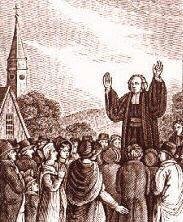 President Bush was speaking with a group of conservative journalists recently and offered his opinion that he believes this country is experiencing a third Great Awakening. His reasons for offering this opinion were that more people that he meets on his travels talk of their faith than ever before. But he also suggests that because more and more people who see his war on terrorism as a matter of good vs. evil, similar to those who supported Lincoln who saw slavery as an issue of good vs. evil, seem to understand that good must win and that there are more people who are siding with his own understanding that good=God and that he's doing the work of God in his War on Terror.
President Bush was speaking with a group of conservative journalists recently and offered his opinion that he believes this country is experiencing a third Great Awakening. His reasons for offering this opinion were that more people that he meets on his travels talk of their faith than ever before. But he also suggests that because more and more people who see his war on terrorism as a matter of good vs. evil, similar to those who supported Lincoln who saw slavery as an issue of good vs. evil, seem to understand that good must win and that there are more people who are siding with his own understanding that good=God and that he's doing the work of God in his War on Terror.Okay, so maybe he didn't say it exactly like that. But he did correlate his war with Lincoln's and he did talk about the War on Terror as a fight between good vs. evil and he did speculate that this country is in the midst of a Great Awakening.
What he didn't say was that Great Awakenings are not political tools, they can't be summoned (they actually are events that are later described as such, rather than saying, "Hey look everyone, we're in a Great Awakening!") Great Awakenings are not about which religion is right and which ones are demonstratedly evil; instead, they are about getting right with God on a large scale. And, it'd happen in many places all at once- a sort of Billy Graham Crusade but with a lot of Billy Grahams and it would inspire great mission and great compassion.
One journalist wrote a story asking if Bush is trying to stir the emotional forces of a dying Christian Coalition back into action. Other journalists have picked up the story, you can read a post on a blog over at the National Review Online. One blogger, which is as cynical as I am, wrote that he thinks its an awful coincidence that the Presidential politics are aimed at supporting such a third Great Awakening.
But you know, politics and religion have gone hand in hand for centuries (or milenias). Each using the other in a sort of 'strange bedfellows' kind of way. Each wanting the other to justify and support their idea of God for them or God leading them. We can read in the Old Testament where even Israel's kings had God leading them in their decisions and justifying their wars. And, we can also read of Israel's great kings who were men who talked a good faith but didn't actually live it very well. Saul had his idols, David had his women, and Solomon had both. And yet, all three claimed God as their justifier for all sorts of political activity.
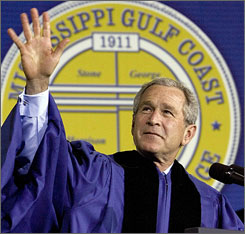 Maybe what Bush is doing is trying to recast America as God's new chosen nation, replacing the Israel that so many fundamentalists believe who are responsible for killing Jesus. Maybe Bush thinks he's a David or a Solomon, I really don't know. But it makes me wonder if he is using the evangelical relationship with divinely inspired Kings to justify his War on Terrorism that is losing the confidence of the American people. It sure seems like another awful coincidence to me.
Maybe what Bush is doing is trying to recast America as God's new chosen nation, replacing the Israel that so many fundamentalists believe who are responsible for killing Jesus. Maybe Bush thinks he's a David or a Solomon, I really don't know. But it makes me wonder if he is using the evangelical relationship with divinely inspired Kings to justify his War on Terrorism that is losing the confidence of the American people. It sure seems like another awful coincidence to me.
Thursday, September 14, 2006
Time Lapse Moon Rise
To me, it makes me feel like I am part of something much larger than myself and it gives me a comfort that is difficult to express. As if what I am doing is part of everything else and, while only brief, what I do (whatever that is) will be contributing to the scheme of life.
How do you feel about the greater scheme of things? To help think about this, check out this example of a time-lapse moon rising.
Wednesday, September 13, 2006
Welcome!
For now, I'll start adding things to the right of this blog, with UCC-related links, fun stuff, and hopefully things that you might enjoy. And, I'll be writing a 'post', an article in which you can respond (if you like) or not.
Thanks for dropping by and if you have any blog related questions, be sure to let me know. I'll be glad to help out in any way I can.
